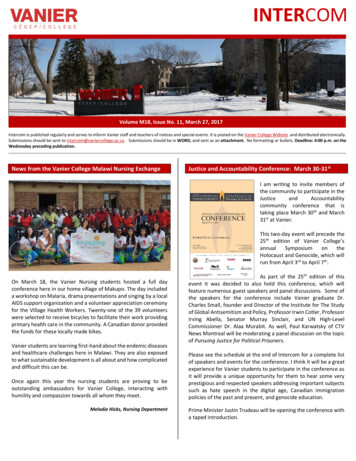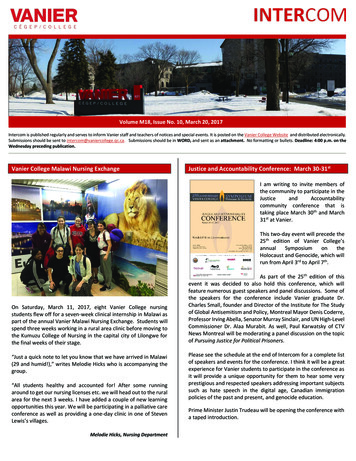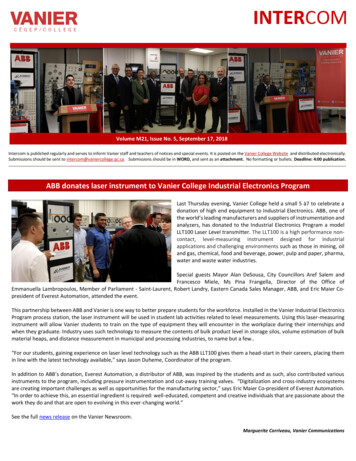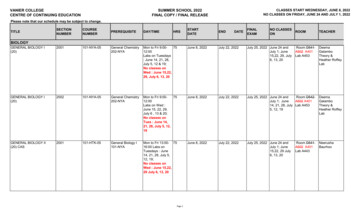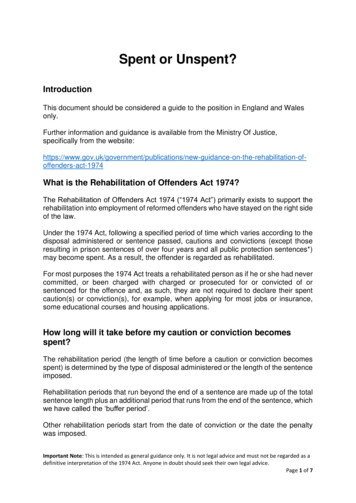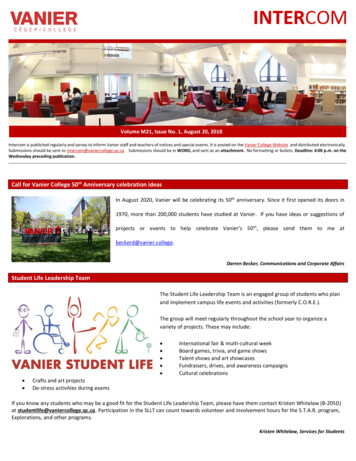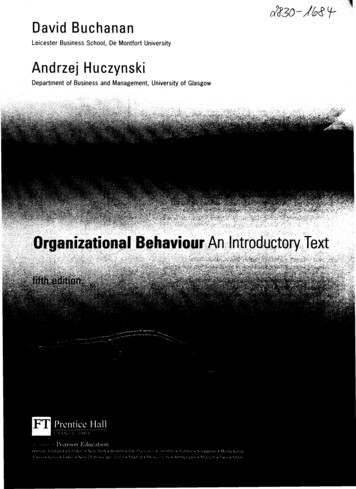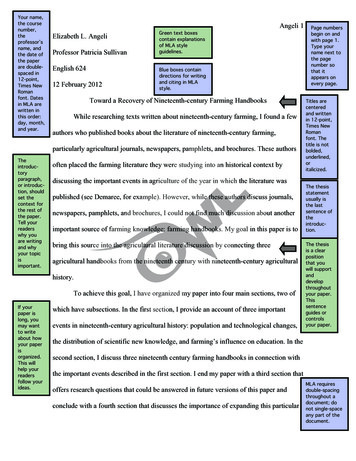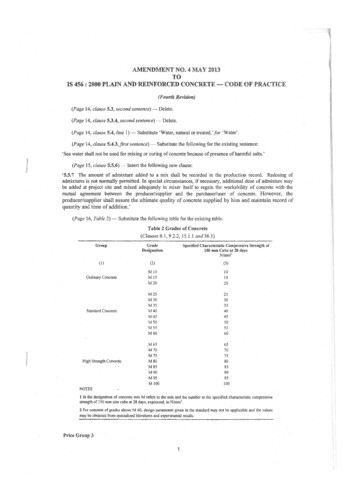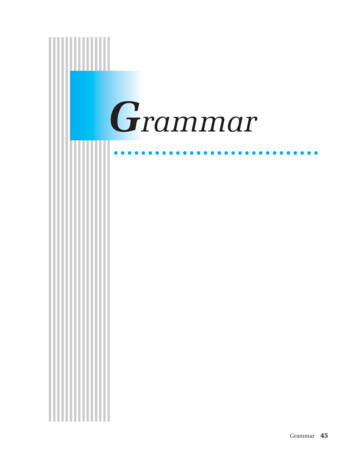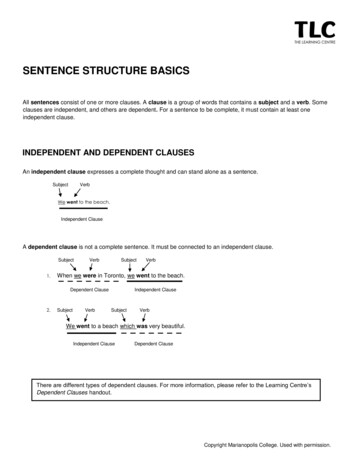
Transcription
SENTENCE STRUCTURE BASICSAll sentences consist of one or more clauses. A clause is a group of words that contains a subject and a verb. Someclauses are independent, and others are dependent. For a sentence to be complete, it must contain at least oneindependent clause.INDEPENDENT AND DEPENDENT CLAUSESAn independent clause expresses a complete thought and can stand alone as a sentence.SubjectVerbWe went to the beach.Independent ClauseA dependent clause is not a complete sentence. It must be connected to an independent clause.Subject1.VerbSubjectWhen we were in Toronto, we went to the beach.Dependent Clause2.VerbSubjectVerbIndependent ClauseSubjectVerbWe went to a beach which was very beautiful.Independent ClauseDependent ClauseThere areare differentdifferent typestypes ofof dependentdependent clauses.clauses. ForFor moremore information,information, pleaseplease referrefer toto thethe Learning Centre’sThereDependent Clauses handout.Learning Centre’s Dependent Clauses handout.Copyright Marianopolis College. Used with permission.
2SENTENCE TYPESThere are four sentence patterns: simple, compound, complex, and compound-complex. The different patterns arecategorized according to various combinations of independent and dependent clauses.SIMPLE SENTENCESThe simple sentence is composed of one independent clause.A simple sentence may have one subject and one verb.SubjectVerbChristine studied.A simple sentence may contain two or more subjects and/or two or more verbs.SubjectsVerbSubjectChristine and Philip studied.VerbsChristine studied and wrote.SubjectsVerbsChristine and Philip studied and wrote.A simple sentence may also contain phrases and other modifiers such as articles, adjectives, and adverbs.SubjectsVerbsYesterday, both Christine and Philip studied hard for their biology midterm and wrote essays for English.IntroductoryAdjectiveword (adverb oftime)AdverbPrepositional Phrase(preposition possessive adjective adjective noun)Direct object(noun preposition proper noun)COMPOUND SENTENCESThe compound sentence is composed of two or more independent clauses but no dependent clauses.There are three ways to join the independent clauses in a compound sentence:1. Two independent clauses may be joined by a semicolon when they have an implied logical relationship.SubjectVerbSubjectVerbsLily travelled to Europe last summer; Dan found a job and stayed in his hometown.SemicolonCopyright Marianopolis College. Used with permission.
32. Two independent clauses may be joined by a comma and a coordinating conjunction. The sevencoordinating conjunctions are easily remembered with the mnemonic device FANBOYS.SubjectVerbSubjectVerbsLily travelled to Europe last summer, but Dan found a job and stayed in his hometown.ForAndNorButOrYetSoComma Coordinating Conjunction3. Two independent clauses may be joined by a semicolon, a transitional word or phrase, and a comma.SubjectVerbSubjectVerbsLily travelled to Europe last summer; however, Dan found a job and stayed in his hometown.Semicolon transitional word commaHere are some examples of commonly used transitional words and phrases:HoweverThereforeFurthermoreMoreoverOn the other handNonethelessSimilarlyUndoubtedlyFor instanceFor LEX SENTENCESThe complex sentence is composed of one independent clause and one or more dependent clauses.The dependent clauses may be located in any of the following positions within a complex sentence: before theindependent clause, after the independent clause, before and after the independent clause, or interrupting theindependent clause.CommaWhen he finishes university, Tim hopes to move to British Columbia.Dependent ClauseDependent clauselocated beforeindependent clause.Independent ClauseNo CommaTim hopes to move to British Columbia when he finishes university.Independent ClauseDependent ClauseDependent clauselocated afterindependent clause.Copyright Marianopolis College. Used with permission.
4I read the story that you wrote.IndependentClauseDependent clauselocated afterindependent clause.Dependent ClauseCommaDependent clauselocated beforeindependent clause,dependent clauselocated afterindependent clause.While I was on the train, I read the story that you wrote.Dependent ClauseIndependentClauseDependent ClauseDependent clauseinterrupting theindependent clause.The man who interviewed me asked a lot of challenging questions.Dependent ClauseIndependentClauseCOMPOUND—COMPLEX SENTENCESThe compound-complex sentence is composed of two or more independent clauses and one or moredependent clauses.Until I finish my exams, I have to study every night; otherwise, I would definitely join you for the concert.Dependent ClauseIndependent ClauseIndependent ClauseDavid was confused about the assignment that was due on Tuesday, so he asked his teacher for help.Dependent ClauseIndependent ClauseIndependent ClauseWe were all delighted when Catherine came home; she had been away so long!Independent ClauseDependent ClauseIndependent ClauseCopyright Marianopolis College. Used with permission.
5EXERCISESA. Identify the subjects and verbs in the following sentences by writing an “S” above the subject and a “V”above the verb. Identify the types of clauses by underlining independent clauses once and dependent clausestwice. Then indicate which type of sentence each one is.Examples:SVSVa. Janine decided to volunteer at the Greyhound Rescue Shelter because she loves dogs.SVSVb. Janine loves dogs, so she decided to volunteer at the Greyhound Rescue Shelter.SVSCompoundVc. Janine decided to volunteer at a shelter that provides a home to rescued Greyhound dogs.SComplexVSComplexVd. Janine wanted to give back to her community, so she decided to volunteer at a shelterSVthat provides a home to rescued Greyhound dogs.1.I used to have a beautiful plant by my window, but it died when I forgot to water it.2.With lightning speed, the defenseman’s perfectly-placed slapshot blasted the puck overCompoundComplexthe goalie’s shoulder and into the top left corner of the net.3.The student finished his essay well before the end of the exam; nonetheless, he was exhaustedfrom the effort of writing and didn’t feel like editing his work.4.My favourite movie, which I’ve seen at least five times, depicts an epic battle betweengood and evil.5.To Sam, nothing in the world could compare to the delicious gingerbread that hisgrandmother prepared for Christmas each year.6.I’ll be waiting for you in the lobby, so just come down when you’re ready.Copyright Marianopolis College. Used with permission.
6B. Apply your understanding of the four sentence patterns by writing sentences according to the instructionsbelow. Practice restating the same ideas in different ways using the sentence patterns. (See the “Example” boxon page 5.)1.Write a simple sentence.2.Write a compound sentence that joins the clauses with a comma and a coordinating conjunction.3.Write a compound sentence that joins the clauses with a semicolon.4.Write a compound sentence that joins the clauses with a semicolon, a transitional word or phrase, and a comma.5.Write a complex sentence that includes an independent clause followed by a dependent clause beginning withbecause or although.6.Write a complex sentence that includes an independent clause interrupted by a dependent clause beginning withwho, that, or which.7.Write a complex sentence that includes a dependent clause beginning with after, when, or while followed by anindependent clause.8.Write a compound-complex sentence.Copyright Marianopolis College. Used with permission.
When we were in Toronto, we went to the beach. Dependent Clause Independent Clause 2. Subject Verb Subject Verb Independent Clause Dependent Clause There are different types of dependent clauses. For more information, please refer to the Learning Centre's Dependent Clauses handout. We went to the beach.
